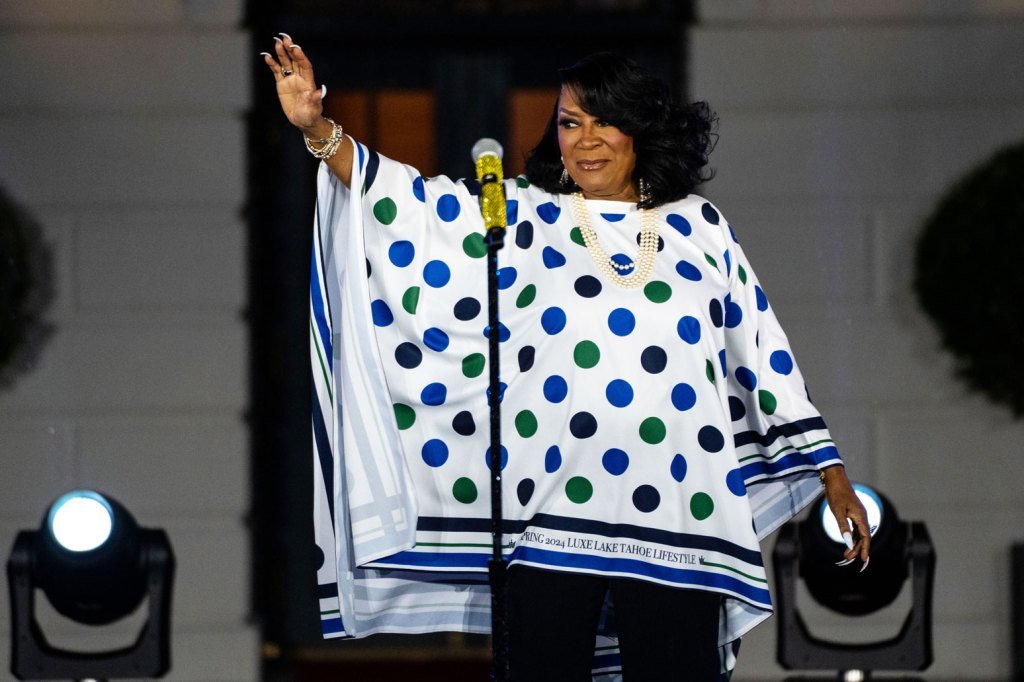Gladys Knight glistened through renditions of “I Heard It Through the Grapevine” and “Midnight Train to Georgia.” Patti LaBelle kicked off her shoes during a spirited rendering of “Oh, People.” Kirk Franklin took the crowd to church and brought Vice President Kamala Harris on stage for a twirl, and Charlie Wilson closed things down with an extended call and repeat after declaring, “Our ancestors are smiling down on us celebrating something that would have seemed unfathomable.”
The second White House concert in celebration of Juneteenth, held on Monday (June 10), was a joyous affair from start to finish. The performances were bookended by opening remarks from VP Harris and closing comments from President Joe Biden, who both stayed for the entire event that took place three years after Biden signed bipartisan legislation establishing June 19 as a federal holiday to commemorate the end of slavery in the United States.
“Next Wednesday, across our nation, Americans will come together with generations of loved ones to celebrate Black excellence and leadership, culture and community, resilience and resistance,” said Harris. “And to remember our nation’s history in full.”
“The White House lawn’s never seen anything like this before,” Biden noted, before warning that “old ghosts in new garments are trying to take us back” in time. “Taking away your freedoms, making it harder for Black people to vote or have your vote counted. Closing doors of opportunity, attacking the values of diversity, equity and inclusion. If you can believe it, banning books about Black experience. Black history is American history.”

Kamala Harris dances with US singer Kirk Franklin during a Juneteenth Concert in the South Lawn of the White House in Washington, DC on June 10, 2024.
BRENDAN SMIALOWSKI/AFP via Getty Images
Musical performances spanned a gamut of genres and decades. Anthony Hamilton, Brittney Spencer, Trombone Shorty, Raheem DeVaughn, Doug E. Fresh and Patina Miller also took the stage.
And while the South Lawn was alight with dancing and jubilation, host Roy Wood Jr. made sure attendees — including Billy Porter, George Floyd’s brother Philonise Floyd and sister-in-law Keeta Floyd, leaders of the National Black Caucus, second gentleman Doug Emhoff and dozens of federal and state lawmakers including Sen. Edward Markey (D-Mass.), Rep. Maxine Waters (D-Calif.) and Rep. Sheila Cherfilus-McCormick (D-Fla.) — remembered the reason for the celebration.
Between musical acts and his own humorous quips, the comedian-actor provided context by outlining the chapters and principal players of Juneteenth history. “It’s important to know how we got all the way from enslavement to the first Black woman vice president and the first Black woman on the Supreme Court,” he said, referring to Ketanji Brown Jackson.
Franklin told Billboard pre-show that because of his Texas roots, Juneteenth has been an integral part of his life since childhood. “Now, for it to be celebrated within the framework of American culture is a very important transition because it gives credence to those moments in time where revisionist history somewhat erased those valuable contributions that people of color made to this country,” he said. “When we have allies in every corner of the American experience, it makes these moments even stronger. When we can celebrate those that were forgotten, overlooked, that were not given the same opportunities and freedoms … Juneteenth definitely is one of those eras in history that I love to see that we are reimagining and rewriting so the next generation can understand the value and importance of trying to get it right.”
Being able to come together through music, he added, is gift. “Especially the kind of music that I do. To do spiritual music, to do gospel music … those were the sounds that were echoing through the chambers of the Black experience during that era, and they were also the songs that were coded and road maps to freedom. Gospel music has always been that beacon of light for our people in one of the darkest of times. So to be here to be the representative of the genre is very humbling.”



